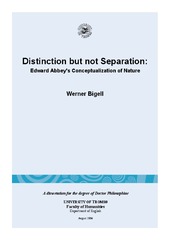Distinction but not separation. Edward Abbey’s conceptualization of nature
Permanent link
https://hdl.handle.net/10037/1227Date
2007-11-21Type
Doctoral thesisDoktorgradsavhandling
Author
Bigell, WernerAbstract
Edward Abbey (1927-1989) har blitt en av de mest kjente og kontroversielle amerikanske
forfattere i feltet ”nature writing.” Han blir ansett som en del av den radikale
miljøbevegelsen i USA, og det blir ofte hevdet at naturbegrepet hans er basert på Arne Næss sin ”dypøkologi” som er et program for å re-integrere mennesket i naturen. I en
analyse av Abbeys arbeid derimot viser det seg at det mest fremtredende element i hans
forfatterskap er distinksjon—individets eller menneskets distinksjon som erfares gjennom en sterkt fysisk nærhet til naturen. Dette naturkonseptet har, i Abbeys tilfelle, sitt opphav i en kalvinistisk naturforståelse som har utviklet seg til en slags natureksistensialisme og som viser fellestrekk med den norske forfatteren og filosofen Peter Wessel Zapffe. Abbey ser naturen hovedsakelig som et ”heterotopia”, et rom innenfor en kultursammenheng, men med avvikende regler. Naturen blir ikke til et alternativ til kulturen, men naturen er et rom hvor kulturelle erfaringer kan bli gjort. Abbey har et ambivalent forhold til det moderne samfunnet, på den ene siden beskriver og forsvarer han former for naturbruk som er kompatible med et moderne samfunn, og på den andre siden advarer han mot destruktive tendenser i det samme moderne samfunnet. Videre har Abbey et ambivalent forhold til miljøbevegelsen: Han støtter de praktiske målene deres, men er kritisk til dens dypøkologiske fundamentet og også til dens fokusering på middelklassen. I en del av Abbeys verker er sosial klasse et hovedtema. Naturbegrepet har alltid vært et problematisk begrep, og denne analysen er basert på en posisjon mellom konstruktivisme og realisme; natur blir betraktet som en ekstern virkelighet som blander seg opp i den kulturelle konstruksjonen av virkeligheten uten å bestemme den. Abbey beskriver hvordan naturrom blir brukt og appropriert på en temporær måte uten at det kan brukes som grunnlag for kulturelle meninger. The concept of nature in the texts of Edward Abbey has a complex meaning. Although Abbey supported the radical environmental movement in the US, nature in his texts cannot be reduced to an entity in need of protection. Whereas many texts in the genre of nature writing have a pastoral theme, aiming at reconciliation between humanity and nature, in Abbey one finds an existential understanding of nature that has a parallel in the Norwegian philosopher and writer Peter Wessel Zapffe. On one hand Abbey’s nature descriptions are marked by physical proximity of human beings and nature, on the other there is an element of human distinction that can only be overcome in death. Using Calvin’s phrase, it can be said that in Abbey’s writing human beings are “distinct but not separate” from nature, and his writing can be seen as part of a nature-existentialist strain in American literature that has been influenced by Calvinism; other writers in this strain are Robinson Jeffers and Paul Bowles. This thesis furthermore discusses the question of representation of nature in literature and proposes a theoretical “middle ground” between postmodern constructivism and naïve realism, inspired by the sociologist Norbert Elias. In this context Michel Foucault’s idea of “heterotopia” is useful for describing the social functions of natural spaces without reducing nature to a linguistic construct or having to rely on the nature-culture dichotomy. Abbey’s natural spaces are not escapes from the modern world but are spaces where modern life can be experienced and complemented. The historian Marshall Berman defines the stages of the modern age and shows that characteristics of modernity that mark an earlier modern age have been lost in modernity’s later development; however, early modern characteristics can still be found in natural spaces. As the city before suburban compartmentalization, Abbey’s nature is marked by openness in terms of access to public spaces, by casual encounters with strangers, by continuous change, and by a feeling of rootlessness. Abbey furthermore stresses the element of classlessness of modern spaces and shows that natural spaces are more than refuges for endangered species and solitude-seeking middle class environmentalists, but can be appropriated by all social classes.
Publisher
Universitetet i TromsøUniversity of Tromsø
Metadata
Show full item recordCollections
Copyright 2007 The Author(s)
The following license file are associated with this item:


 English
English norsk
norsk